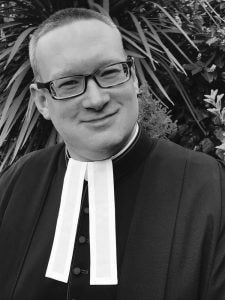 CHRISTMAS MESSAGE December, 2021 from The Rt Revd Dr Andrew Linley, FSJ Faculty Dean As we begin Advent, another strange and turbulent year draws to a close, with the prospect of a second disrupted Christmas celebration looming over some parts of the world. The last eighteen months have brought unprecedented upheavals to our lives, among the most unsettling of which have been those which prevented us gathering in person, either for casual get-togethers with friends and family, or for more formal rites of passage, such as weddings and funerals, or the planned degree ceremonies of universities – including our own. This separation from others has brought a profound sense of unease, and, in some cases, very real personal trauma. Few images of 2021 can have been so affecting as that from my own United Kingdom, of our Queen, Elizabeth II, seated alone and masked in the choir stalls of St George’s Chapel, Windsor Castle, at the funeral of her beloved Consort of more than 70 years, Prince Philip, Duke of Edinburgh. Particularly striking though this image was, it is sobering to remember that it reflected one among millions of harrowing experiences of separation brought about by the pandemic conditions. These traumas have highlighted the importance of personal contact to the human condition: much as modern media has done to offset the difficulties of physical isolation, it has become abundantly clear that the likes of Zoom are only a partial substitute for meeting in the flesh. It is particularly apt to consider this as we approach Christmas, the feast of the Incarnation of our blessed Lord Jesus Christ. At every Midnight Mass and carol service around the world are read those resounding words from St John’s Gospel, ‘and the Word was made flesh, and dwelt among us.’ The Word was made flesh. That is the meaning of the Incarnation – that the Word, Christ, the living power of God, took upon him human flesh, and lived among us, having been born in the humblest of surroundings. His mission was to save us from our sins, by taking our own fleshly nature upon him and consecrating it forever unto immortality. This, we notice, is the Word made flesh, not the flesh made words. How different, then, the Christian attitude is from that of currently fashionable philosophies, which seem to view the physical plane primarily as a state of existence to be transcended and done away. It is not difficult to discern the influence of such worldviews in the impulse, under pandemic conditions, to reduce or remove human contact from our daily lives, on a semi-permanent basis, to be replaced largely by digital means of communication. This difference in attitude is exemplified by the prevalence in the Christian life of sacraments: acts of worship in which physical objects, such as water, bread, wine, oil, or the touch of the human hand itself, become not only signs of God’s grace acting upon those who receive them, but the very means by which such grace is bestowed and received. It goes without saying that the physical presence of the worshipper is an absolute requirement if one is to partake of the sacramental life of the Church. One might speculate as to whether much of the loneliness and despair felt by so many in recent times is, at least in part, the result of withdrawal from these sacramental channels of God’s sustaining grace, not to mention from the image of God’s love borne in the faces of other people. Let us hope and pray for a very different Christmas this year, in which we are able to be present to receive the Incarnate Lord in the Blessed Sacrament of the Eucharist, and to experience his love in and through the presence of our loved ones and fellow worshippers. On behalf of the Faculty, I send you my blessings and good wishes for the Christmas season, and the New Year to come.
1 Comment
David Paul Oldfield
18/12/2021 06:22:11 pm
Thank you for that - especially as a Circuit Breaker after Boxing Day becomes more and more likely.
Reply
Leave a Reply. |
AuthorNews published by the FLM. Archives
December 2021
Categories |
- Home
- About
- Council
- Membership
- Academic Dress
- News
-
Links
- Johann Heinrich Pestalozzi Christian University
- Curwen College of Music
- Fraternity of Saint Cecilia
- Guild of Musicians & Singers
- International Music Examinations Board
- National College of Music, London
- North & Midlands School of Music
- Three Counties School of Music
- Victoria College of Music, London >
- Contact Us

 RSS Feed
RSS Feed